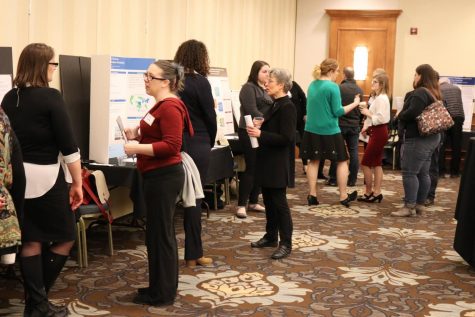CETL Learning Tips: Bandwidth recovery
It is fitting that a month ago, Cia Vershelden came to campus to talk about “bandwidth recovery,” the idea that when our basic needs are stressed — such as food, shelter, mental health and safety — our capacity to learn decreases. We can’t simply power through it or leave it at the door. The type of higher level learning we are here at college to do just isn’t possible when we’re hungry, scared and stressed. Some forces decrease our bandwidth more than others.
Vershelden’s book on this topic focuses on issues embedded deep in our society, such as poverty, racism and other forms of social marginalization. But when all of our classes moved suddenly and unexpectedly off campus, we all likely experienced a significant dip in our bandwidth. How are we supposed to keep going in our classes when we’re suddenly home with an old desktop while siblings are scattered and stuck elsewhere, our parents might be losing work, and all of our normal routines are upended? How are we supposed to keep going in our classes when our professors are likely experiencing the same issues, all while trying to shift to a teaching mode they may have never practiced before?
Recharge like it’s your job. With bandwidth down and no clear end in sight to this current situation, take your health and well-being more seriously than ever. Physical health, mood, sleep — it is all critical to getting through the rest of the semester. Eat an apple, get up and move (the weather’s warming up), talk to people and read fiction. Opt for well-being that will get your energy up rather than down.
In “Bandwidth Recovery,” Vershelden says some conditions can help us recover our bandwidth, especially solid connections with other people we can count on and who support us. Connect with these people, focusing especially on those who always give you a big boost.
Be a part of the solution. One proven strategy to counteract being overwhelmed by a widespread tragedy or hardship is to find a way to help, big or small. Help fellow students in your classes, especially those you know are struggling. Play with your younger siblings who are cooped up. Clean your room.
If something is bothering you about how this situation is being dealt with at OU, in your community, or another part of your world, make that heard. Talk to Student Congress. Write to the Oakland Post (they’re here still running the paper — how awesome is that?). When OU asks your input, give it. Make sure you’re registered to vote. When Representative Elissa Slotkin came to campus last month, she guaranteed getting involved in your community will make you feel better. Put positive vibes on social media.
Give yourself a break, and press on. Even if you were absolutely stellar this semester, your productivity is probably taking a hit. Be real with yourself: acknowledge that this semester may not be your best work. Accept limitations, adjust expectations, but then set goals that will get you through this semester. It will be so much easier to just get through this semester than drop. You won’t want to pick all of this up again or start over. Make a goal for today, for tomorrow, for next week, through to the end of the semester. If you’re not sure how to do any of this, talk to your adviser. They are still ready to get you through.
Our campus may be sparser these days, but the whole community is still in this together.
Christina Moore is the virtual faculty developer at the Center for Excellence in Teaching and Learning. She’s finishing up two graduate courses that have moved online. Share what’s working well for you this semester by emailing Christina at [email protected]. Find more Learning Tips at oakland.edu/teachingtips.








